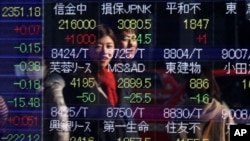World Bank experts on Tuesday predicted an "uptick" in global economic growth in 2015, but they cut the prediction they made in June and said much of the economy was still "fragile."
The organization's twice-yearly Global Economic Prospects report predicted an increase in growth of 3 percent, down from the previous forecast of 3.4 percent. The annual figure will reach 3.3 percent in 2016, as opposed to a June forecast of 3.5 percent, before dipping to 3.2 percent in 2017, it said.
The changes for the 2015 forecast were the result of disappointing economic prospects in the eurozone, Japan and some major emerging economies, which offset the benefit of lower oil prices. Strong growth prospects in the United States and Britain separated them from other wealthier nations, which continue to face anemic economies and deflation fears, the report said.
Other threats to global growth include weak trade, rising interest rates and possible volatility in financial markets, it said.
"The global economy is running on a single engine ... the American one," World Bank chief economist Kaushik Basu told reporters. "This does not make for a rosy outlook for the world."
Among emerging markets, Brazil and Russia in particular weighed on the bank's global growth predictions, along with China, which is in a managed slowdown as it transitions away from an investment-led growth model.
Basu said India's economic growth should finally catch up to China's next year and in 2017, at a clip of about 7 percent.
Like other forecasters, the World Bank predicted the roughly 60 percent drop in global oil prices since June should be a net positive for the world economy, boosting oil-importing countries. But while the bank expected oil prices to stay low this year, it said the positive price shock could take several years to feed into its growth outlook, while increasing short-term market volatility and reducing investments in unconventional oil such as shale and deep sea oil.
The immediate impact of lower crude prices was limited to a 0.1 percentage-point boost to the global outlook this year, the World Bank said.
World Bank President Jim Yong Kim said the "uncertain" economic outlook makes it vital for developing nations to expand programs that help the poor and to remove obstacles to the private investment that is a key source of new jobs.
Some information for this report came from Reuters.
